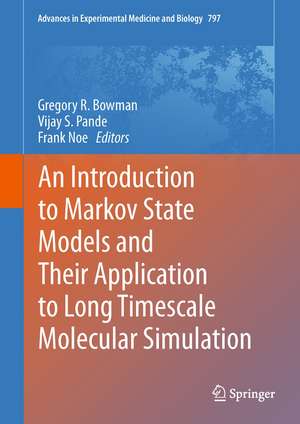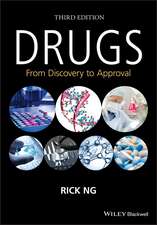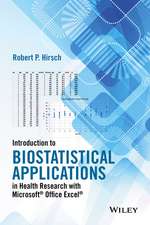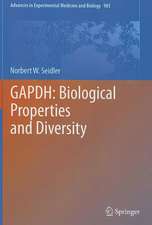An Introduction to Markov State Models and Their Application to Long Timescale Molecular Simulation: Advances in Experimental Medicine and Biology, cartea 797
Editat de Gregory R. Bowman, Vijay S. Pande, Frank Noéen Limba Engleză Hardback – 18 dec 2013
The Markov state model (MSM) approach aims to address two key challenges of molecular simulation:
1) How to reach long timescales using short simulations of detailed molecular models.
2) How to systematically gain insight from the resulting sea of data.
MSMs do this by providing a compact representation of the vast conformational space available to biomolecules by decomposing it into states sets of rapidly interconverting conformations and the rates of transitioning between states. This kinetic definition allows one to easily vary the temporal and spatial resolution of an MSM from high-resolution models capable of quantitative agreement with (or prediction of) experiment to low-resolution models that facilitate understanding. Additionally, MSMs facilitate the calculation of quantities that are difficult to obtain from more direct MD analyses, such as the ensemble of transition pathways.
This book introduces the mathematical foundations of Markov models, how they can be used to analyze simulations and drive efficient simulations, and some of the insights these models have yielded in a variety of applications of molecular simulation.
| Toate formatele și edițiile | Preț | Express |
|---|---|---|
| Paperback (1) | 1277.86 lei 6-8 săpt. | |
| SPRINGER NETHERLANDS – 18 sep 2016 | 1277.86 lei 6-8 săpt. | |
| Hardback (1) | 1217.46 lei 6-8 săpt. | |
| SPRINGER NETHERLANDS – 18 dec 2013 | 1217.46 lei 6-8 săpt. |
Din seria Advances in Experimental Medicine and Biology
- 9%
 Preț: 719.60 lei
Preț: 719.60 lei - 20%
 Preț: 691.93 lei
Preț: 691.93 lei - 5%
 Preț: 717.00 lei
Preț: 717.00 lei - 5%
 Preț: 716.28 lei
Preț: 716.28 lei - 5%
 Preț: 717.20 lei
Preț: 717.20 lei - 15%
 Preț: 640.24 lei
Preț: 640.24 lei - 5%
 Preț: 1113.83 lei
Preț: 1113.83 lei - 5%
 Preț: 715.71 lei
Preț: 715.71 lei - 5%
 Preț: 820.43 lei
Preț: 820.43 lei - 15%
 Preț: 641.38 lei
Preț: 641.38 lei - 5%
 Preț: 716.28 lei
Preț: 716.28 lei - 5%
 Preț: 523.99 lei
Preț: 523.99 lei - 5%
 Preț: 1031.00 lei
Preț: 1031.00 lei - 5%
 Preț: 717.00 lei
Preț: 717.00 lei - 5%
 Preț: 715.35 lei
Preț: 715.35 lei - 20%
 Preț: 1161.71 lei
Preț: 1161.71 lei - 5%
 Preț: 1170.51 lei
Preț: 1170.51 lei - 18%
 Preț: 1119.87 lei
Preț: 1119.87 lei - 5%
 Preț: 1288.48 lei
Preț: 1288.48 lei - 5%
 Preț: 1164.67 lei
Preț: 1164.67 lei - 5%
 Preț: 1101.73 lei
Preț: 1101.73 lei - 18%
 Preț: 1123.67 lei
Preț: 1123.67 lei - 5%
 Preț: 1435.64 lei
Preț: 1435.64 lei - 20%
 Preț: 1044.10 lei
Preț: 1044.10 lei - 18%
 Preț: 946.39 lei
Preț: 946.39 lei - 5%
 Preț: 292.57 lei
Preț: 292.57 lei - 18%
 Preț: 957.62 lei
Preț: 957.62 lei - 18%
 Preț: 1235.76 lei
Preț: 1235.76 lei - 5%
 Preț: 1231.55 lei
Preț: 1231.55 lei - 5%
 Preț: 1292.30 lei
Preț: 1292.30 lei - 5%
 Preț: 1102.10 lei
Preț: 1102.10 lei - 18%
 Preț: 1132.81 lei
Preț: 1132.81 lei - 5%
 Preț: 1165.19 lei
Preț: 1165.19 lei - 5%
 Preț: 1418.48 lei
Preț: 1418.48 lei - 5%
 Preț: 1305.63 lei
Preț: 1305.63 lei - 18%
 Preț: 1417.72 lei
Preț: 1417.72 lei - 18%
 Preț: 1412.99 lei
Preț: 1412.99 lei - 24%
 Preț: 806.16 lei
Preț: 806.16 lei - 18%
 Preț: 1243.29 lei
Preț: 1243.29 lei - 5%
 Preț: 1429.44 lei
Preț: 1429.44 lei - 5%
 Preț: 1618.70 lei
Preț: 1618.70 lei - 5%
 Preț: 1305.12 lei
Preț: 1305.12 lei - 18%
 Preț: 1124.92 lei
Preț: 1124.92 lei - 5%
 Preț: 1097.54 lei
Preț: 1097.54 lei - 15%
 Preț: 649.87 lei
Preț: 649.87 lei - 5%
 Preț: 1097.54 lei
Preț: 1097.54 lei - 18%
 Preț: 945.79 lei
Preț: 945.79 lei - 5%
 Preț: 1123.16 lei
Preț: 1123.16 lei
Preț: 1217.46 lei
Preț vechi: 1281.55 lei
-5% Nou
Puncte Express: 1826
Preț estimativ în valută:
232.99€ • 242.35$ • 192.35£
232.99€ • 242.35$ • 192.35£
Carte tipărită la comandă
Livrare economică 15-29 aprilie
Preluare comenzi: 021 569.72.76
Specificații
ISBN-13: 9789400776050
ISBN-10: 9400776055
Pagini: 400
Ilustrații: XII, 139 p. 65 illus., 48 illus. in color.
Dimensiuni: 178 x 254 x 15 mm
Greutate: 0.5 kg
Ediția:2014
Editura: SPRINGER NETHERLANDS
Colecția Springer
Seria Advances in Experimental Medicine and Biology
Locul publicării:Dordrecht, Netherlands
ISBN-10: 9400776055
Pagini: 400
Ilustrații: XII, 139 p. 65 illus., 48 illus. in color.
Dimensiuni: 178 x 254 x 15 mm
Greutate: 0.5 kg
Ediția:2014
Editura: SPRINGER NETHERLANDS
Colecția Springer
Seria Advances in Experimental Medicine and Biology
Locul publicării:Dordrecht, Netherlands
Public țintă
GraduateCuprins
An overview and practical guide to building Markov state models.- Markov model theory.- Estimation and Validation of Markov models.- Uncertainty estimation.- Analysis of Markov models.-
Transition Path Theory.- Understanding Protein Folding using Markov state models.- Understanding Molecular Recognition by Kinetic Network Models Constructed from Molecular Dynamics Simulations.- Markov State and Diffusive Stochastic Models in Electron Spin Resonance.- Software for building Markov state models.
Transition Path Theory.- Understanding Protein Folding using Markov state models.- Understanding Molecular Recognition by Kinetic Network Models Constructed from Molecular Dynamics Simulations.- Markov State and Diffusive Stochastic Models in Electron Spin Resonance.- Software for building Markov state models.
Textul de pe ultima copertă
The aim of this book volume is to explain the importance of Markov state models to molecular simulation, how they work, and how they can be applied to a range of problems.
The Markov state model (MSM) approach aims to address two key challenges of molecular simulation:
1) How to reach long timescales using short simulations of detailed molecular models
2) How to systematically gain insight from the resulting sea of data
MSMs do this by providing a compact representation of the vast conformational space available to biomolecules by decomposing it into states—sets of rapidly interconverting conformations—and the rates of transitioning between states. This kinetic definition allows one to easily vary the temporal and spatial resolution of an MSM from high-resolution models capable of quantitative agreement with (or prediction of) experiment to low-resolution models that facilitate understanding. Additionally, MSMs facilitate the calculation of quantities that are difficult to obtain from more direct MD analyses, such as the ensemble of transition pathways.
This book introduces the mathematical foundations of Markov models, how they can be used to analyze simulations and drive efficient simulations, and some of the insights these models have yielded in a variety of applications of molecular simulation.
The Markov state model (MSM) approach aims to address two key challenges of molecular simulation:
1) How to reach long timescales using short simulations of detailed molecular models
2) How to systematically gain insight from the resulting sea of data
MSMs do this by providing a compact representation of the vast conformational space available to biomolecules by decomposing it into states—sets of rapidly interconverting conformations—and the rates of transitioning between states. This kinetic definition allows one to easily vary the temporal and spatial resolution of an MSM from high-resolution models capable of quantitative agreement with (or prediction of) experiment to low-resolution models that facilitate understanding. Additionally, MSMs facilitate the calculation of quantities that are difficult to obtain from more direct MD analyses, such as the ensemble of transition pathways.
This book introduces the mathematical foundations of Markov models, how they can be used to analyze simulations and drive efficient simulations, and some of the insights these models have yielded in a variety of applications of molecular simulation.
Caracteristici
In-depth review of the mathematical underpinnings of Markov state models Practical insight into applying Markov state models to molecular systems Points readers to freely available software for constructing Markov state models Includes supplementary material: sn.pub/extras









